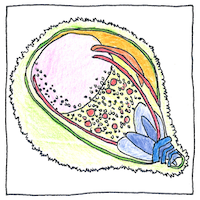Charles Louis Alphonse
Laveran, Patrick Manson,
Ronald Ross
parasitology

|
Malarial parasite
Ronald Ross found the eggs of the parasite in the stomach wall of a specific species of mosquito and showed that they got there by feeding on the blood of a man with malaria. Alphonse Laveran had already, in 1880, discovered the malarial parasite, and Patrick Manson had suggested, in 1894, that malaria was transmitted by mosquitoes.
Life cycle
A female mosquito of the species Anopheles, to get protein to produce her eggs, sucks human blood. To reduce clotting and constriction of your blood vessels, the mosquito injects her saliva, infected with sporozoites, beneath your skin, from where the sporozoites migrate into your bloodstream. The sporozoites collect in your liver where they invade cells and set up homes, transform into a rounded form, and mature into schizonts containing many merozoites. Merosomes bud off the infected liver cells and these lodge in capillaries of the lungs where they disintegrate, releasing thousands of merozoites, which invade red blood cells. In red blood cells, the merozoites transform into ring-shaped and trophozoite forms and they divide several times into new merozoites that escape and invade other red blood cells. Some merozoites get into your bone marrow, change into male or female gametocytes, then freely circulate in your blood, which the female mosquito sucks up. In the mosquito’s midgut, the gametocytes change into gametes, fertilize each oher, become diploid zygotes, and transform into invasive ookinetes that escape the gut. Outside the gut, they invade cells and set up homes where they divide and produce thousands of sporozoites. The sporozoites migrate to the salivary glands from where they are injected into their next host.
A bad thing happens
Mosquitoes suck as if there were good and bad. You do not like the parasite and neither does the mosquito. It is unfortunate that humans make such good hosts for this worm.



Ronald Ross studied malaria at a hospital in Calcutta India from 1882 to 1899. In 1897, he contracted malaria, was transferred to a medical school in Secunderabad, and there he discovered the plasmodium parasite in Anopheles mosquitoes.
See also in The book of science:
Readings in wikipedia: